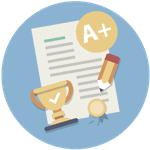 When doing or completing a Master's thesis, one of the most critical components that demands meticulous attention is the literature review. This section serves as the foundation upon which your research stands, demonstrating your understanding of existing records while framing the context for your study. Composing a good literature review can be tough, often requiring the expertise of skilled experts like us. We will look into the attributes that define our experts and the invaluable assistance they can offer to graduate students seeking to excel in their academic studies. The literature review section in a Master's thesis plays a critical and diverse role as it requires the writer to not only summarize relevant research but also critically analyze and synthesize it to identify gaps in knowledge and establish the rationale for their own study. This complexity necessitates the involvement of our seasoned professionals who possess a deep understanding of the subject matter and are adept at exploring the vast academic literature. Our experts have extensive knowledge in their respective fields as they have spent years honing their expertise, often holding advanced degrees themselves, and are well-versed in the latest research trends and methodologies. Their command of the subject matter allows them to discern the most pertinent sources and extract valuable insights to enrich the literature review. Our experts possess excellent research and analytical skills to help them sift through a plethora of scholarly articles, books, and other sources, identifying key themes, debates, and methodological approaches. Their ability to critically evaluate the quality and relevance of sources ensures that only the most credible and pertinent literature is incorporated into the review. Most experts are adept at structuring the review in a coherent and logical manner. We help synthesize diverse perspectives, highlighting connections and discrepancies in the literature, which not only provides a comprehensive overview but also sets the stage for the formulation of research questions and hypotheses in the thesis. The literature review is a critical element of any Master's thesis, and the assistance of our experts can prove to be invaluable. They can craft a literature review that not only meets the highest academic standards but also contributes substantially to the overall quality of the thesis.
When doing or completing a Master's thesis, one of the most critical components that demands meticulous attention is the literature review. This section serves as the foundation upon which your research stands, demonstrating your understanding of existing records while framing the context for your study. Composing a good literature review can be tough, often requiring the expertise of skilled experts like us. We will look into the attributes that define our experts and the invaluable assistance they can offer to graduate students seeking to excel in their academic studies. The literature review section in a Master's thesis plays a critical and diverse role as it requires the writer to not only summarize relevant research but also critically analyze and synthesize it to identify gaps in knowledge and establish the rationale for their own study. This complexity necessitates the involvement of our seasoned professionals who possess a deep understanding of the subject matter and are adept at exploring the vast academic literature. Our experts have extensive knowledge in their respective fields as they have spent years honing their expertise, often holding advanced degrees themselves, and are well-versed in the latest research trends and methodologies. Their command of the subject matter allows them to discern the most pertinent sources and extract valuable insights to enrich the literature review. Our experts possess excellent research and analytical skills to help them sift through a plethora of scholarly articles, books, and other sources, identifying key themes, debates, and methodological approaches. Their ability to critically evaluate the quality and relevance of sources ensures that only the most credible and pertinent literature is incorporated into the review. Most experts are adept at structuring the review in a coherent and logical manner. We help synthesize diverse perspectives, highlighting connections and discrepancies in the literature, which not only provides a comprehensive overview but also sets the stage for the formulation of research questions and hypotheses in the thesis. The literature review is a critical element of any Master's thesis, and the assistance of our experts can prove to be invaluable. They can craft a literature review that not only meets the highest academic standards but also contributes substantially to the overall quality of the thesis.
The Attributes of Skilled Master's Thesis Chapter II Writing Experts;
- Strong research skills: This calls on our capacity to locate pertinent materials, assess their value and applicability, and combine them into a coherent story, which necessitates both a thorough comprehension of the research methodology and the topic matter being investigated.
- Excellent writing skills: Our experts can clearly and concisely convey complicated ideas, and they can rationally arrange their ideas and deliver them in an understandable manner. When you ask for master’s thesis literature review help, they are capable of writing in an academic tone that is suitable for the readership.
- Attention to detail: We can identify inconsistencies and gaps in the existing literature and address them appropriately, ensuring that all sources are properly cited and that the paper conforms to the appropriate citation style.
- Ability to think critically: Our experts think critically in order to evaluate the strengths and weaknesses of different sources and arguments and synthesize them into a coherent narrative, which requires not only an understanding of the subject matter but also an ability to evaluate the quality of the research.
- Knowledge of citation styles: As professional writers, we have a good mastery of citation styles to be able to accurately cite all sources in the appropriate format, whether it is APA, MLA, or another style. The process requires not only an understanding of the citation style but also attention to detail.
- Knowledge of the research process: Understanding the research process is key for the writer, which means that they must be familiar with research methods and techniques, data analysis, and research ethics, as well as identifying research gaps and areas for future research.
The attributes of skilled lit review experts at the MSc level are paramount in ensuring the success and quality of a research project. Our professionals play a crucial role in guiding students through the complex process of drafting a comprehensive literature review. Their expertise lies not only in their profound knowledge of the subject matter but also in their ability to synthesize vast amounts of scholarly material, identifying key themes, gaps, and critical debates. Our adeptness in employing rigorous research methodologies, adhering to academic standards, and maintaining a coherent and logical structure is crucial for a compelling review. The importance of hiring experienced writers cannot be overstated when considering the precision required in citation styles and the meticulous attention to detail necessary for a flawless bibliography. Their dedication to originality and adherence to ethical academic standards also ensures the avoidance of plagiarism and a credible scholarly output. The attributes of our writing experts are indispensable for students seeking to produce a well-crafted, academically rigorous, and impactful literature review within their research studies.
How to Write a Literature Review for a Master Thesis – Guidance
 A literature review for a master's thesis is a fundamental step in the research process, demanding a strategic approach and a comprehensive understanding of the chosen subject matter. It plays a critical role in establishing the context, significance, and relevance of your research, showcasing your grasp of existing scholarship, and setting the stage for your original contributions. We intend to explain the best way to do it in relation to a master's degree project while keeping an eye on efficiency to help you complete your thesis promptly. We understand that a literature review is not just a compilation of studies and articles related to your research topic; it's a carefully crafted narrative that synthesizes, evaluates, and critically analyzes the existing literature. It's a journey through the intellectual study of your field, highlighting the gaps, debates, and trends that have shaped the current understanding of your subject. One of the first steps in constructing an effective review is selecting a relevant and manageable research topic. Your topic should align with the objectives of your master's thesis and should be specific enough to enable a focused review. Once you have your topic, extensive research is paramount. We advise you to utilize academic databases, libraries, and online resources to gather a broad spectrum of scholarly works. The next step is organizing and categorizing your sources, where you group them thematically to identify common threads and recurring ideas. This process helps you identify the key debates and trends in your field, which will form the backbone of your thesis review of related literature for master's studies. Ensure your literature review follows a clear structure; start with an introduction that provides an overview of your topic and its significance. Organize the body of your review thematically, chronologically, or methodologically, depending on the nature of your research. Our experts ensure that each section flows logically, with smooth transitions between ideas. Don't just summarize studies; evaluate their methodologies, strengths, weaknesses, and their relevance to your research. We can help you demonstrate how each piece of literature contributes to your understanding of the topic and how it informs your research questions. Be sure to balance the meticulous work of a literature review with the broader task of completing your master's thesis, as it requires effective time allocation. Stay organized, set milestones, and manage your time wisely to ensure you can finish your thesis promptly while maintaining the quality and rigor expected at this academic level.
A literature review for a master's thesis is a fundamental step in the research process, demanding a strategic approach and a comprehensive understanding of the chosen subject matter. It plays a critical role in establishing the context, significance, and relevance of your research, showcasing your grasp of existing scholarship, and setting the stage for your original contributions. We intend to explain the best way to do it in relation to a master's degree project while keeping an eye on efficiency to help you complete your thesis promptly. We understand that a literature review is not just a compilation of studies and articles related to your research topic; it's a carefully crafted narrative that synthesizes, evaluates, and critically analyzes the existing literature. It's a journey through the intellectual study of your field, highlighting the gaps, debates, and trends that have shaped the current understanding of your subject. One of the first steps in constructing an effective review is selecting a relevant and manageable research topic. Your topic should align with the objectives of your master's thesis and should be specific enough to enable a focused review. Once you have your topic, extensive research is paramount. We advise you to utilize academic databases, libraries, and online resources to gather a broad spectrum of scholarly works. The next step is organizing and categorizing your sources, where you group them thematically to identify common threads and recurring ideas. This process helps you identify the key debates and trends in your field, which will form the backbone of your thesis review of related literature for master's studies. Ensure your literature review follows a clear structure; start with an introduction that provides an overview of your topic and its significance. Organize the body of your review thematically, chronologically, or methodologically, depending on the nature of your research. Our experts ensure that each section flows logically, with smooth transitions between ideas. Don't just summarize studies; evaluate their methodologies, strengths, weaknesses, and their relevance to your research. We can help you demonstrate how each piece of literature contributes to your understanding of the topic and how it informs your research questions. Be sure to balance the meticulous work of a literature review with the broader task of completing your master's thesis, as it requires effective time allocation. Stay organized, set milestones, and manage your time wisely to ensure you can finish your thesis promptly while maintaining the quality and rigor expected at this academic level.
Best Way to Compose a Lit Review for a Master's Degree Project;
- Define the research question: The first step in writing a review is to define the research query or topic, which is essential to have a clear understanding of to ensure that the literature review is focused and relevant.
- Conduct a comprehensive literature search: It helps to identify relevant studies and publications through the use of appropriate keywords and search terms to ensure that all relevant literature is identified. A combination of electronic databases can be used to conduct the literature search.
- Select and evaluate sources: Critically evaluate the sources and select the most relevant and high-quality studies and publications that can be done based on the study design, sample size, methodology, and relevance to the research question.
- Organize the literature: The literature review should be organized in a clear and logical manner, for instance, chronologically, thematically, or by the level of evidence, which will make it easier for the reader to follow and understand the review.
- Analyze and synthesize the literature: Critically evaluate the findings of the studies and identify common themes and patterns, as well as identify the strengths and weaknesses of the existing literature. You can ask for help from experts who know how to write a literature review for a master thesis in order to identify the gaps in the literature that the research aims to address.
- Write the literature review: The literature review should be written in a clear and concise manner to provide an overview of the existing publications, summarize and synthesize the findings from various studies, and identify gaps in the literature. Ensure it provides a clear justification for the research question or topic as well as explain how the research aims to contribute to the existing literature.
How can you finish your master’s level thesis quickly?
Finishing your thesis faster requires a well-structured plan, discipline, and effective time management. Start by choosing a topic you are passionate about and have some prior knowledge of, as this will make the research process smoother. Create a detailed outline or roadmap for your thesis, outlining the chapters and subtopics you need to cover. You should set aside dedicated blocks of time each day or week for research and writing. Avoid procrastination and distractions by creating a distraction-free work environment. Use productivity techniques like the Pomodoro method to stay focused during work sessions. You can utilize academic databases, libraries, and online resources to gather relevant literature and data. Take concise notes and organize your research materials effectively using tools like reference management software. It is advisable to start with the easier sections or chapters to build momentum. Stick to a daily word count goal, even if it's modest, and gradually increase it as you get into the flow. Don't obsess over perfection at this stage; the goal is to get your ideas on paper. You may seek feedback from our advisor or peers periodically. Our insights can help you stay on track and improve the quality of your work. Remember that revisions are a part of the process, so don't be discouraged by initial feedback. It is crucial to take breaks, exercise, and get adequate rest to stay mentally sharp as well as utilize productivity tools and apps to stay organized and track your progress. Set a realistic deadline for yourself and stick to it, since having a clear endpoint in sight will motivate you to keep pushing forward. Keep in mind that while finishing quickly is important, the quality of your work should not be compromised. Balancing speed and quality is key to successfully completing your thesis on time.
Formulating a great literature review for your thesis is a pivotal step in your academic career studies. By following our guidance, you can streamline your literature review process and ensure its quality. Start with a clear research question, focus on relevant sources, and employ a critical analysis to synthesize existing knowledge. A well-structured and concise literature review not only strengthens the foundation of your research but also showcases your mastery of the subject matter. The quest to finish your master's thesis quickly should not compromise the rigor and excellence of your work. Effective time management, a systematic approach, and consistent effort are essential. Choosing a topic you're passionate about, maintaining a productive work routine, and seeking our feedback will aid in completing your thesis efficiently. We help in striking a balance between speed and quality is the key to success. The process toward your master's degree is not just about meeting deadlines; it's about contributing valuable insights to your field of study.







 The literature review part, of a master's thesis, serves as the compass guiding your research, a thorough exploration of the existing body of knowledge in your chosen field. A one-size-fits-all approach seldom suffices at the master's level. To do this academic study effectively, customization is essential. Here are the reasons why customization of your master's paper lit review is indispensable and explore how master's students can benefit significantly from the tailored assistance we offer.
The literature review part, of a master's thesis, serves as the compass guiding your research, a thorough exploration of the existing body of knowledge in your chosen field. A one-size-fits-all approach seldom suffices at the master's level. To do this academic study effectively, customization is essential. Here are the reasons why customization of your master's paper lit review is indispensable and explore how master's students can benefit significantly from the tailored assistance we offer.  Does your work Require Rewriting Help?
Does your work Require Rewriting Help?